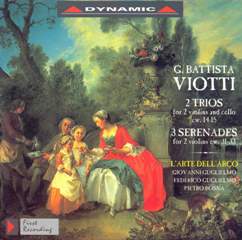Viotti - Trios & Serenades (1995)
Viotti - Trios & Serenades (1995)

01] Trio 2 In E Major Cw.14: Moderato Con Espressione 02] Trio 2 In E Major Cw.14: Andante Con Un Poco Di Moto 03] Trio 2 In E Major Cw.14: Allegretto 04] Trio 3 In G Major Cw.15: Allegro Vivace E Risoluto 05] Trio 3 In G Major Cw.15: Andante Con Espressione 06] Trio 3 In G Major Cw.15: Presto 07] Serenata 1 In A Major Cw.31: Andante-Menuetto 08] Serenata 1 In A Major Cw.31: Andante 09] Serenata 1 In A Major Cw.31: Andante-Allegretto 10] Serenata 2 In D Major Cw.32: Andante 11] Serenata 2 In D Major Cw.32: Andante 12] Serenata 2 In D Major Cw.32: Allegretto 13] Serenata 2 In D Major Cw.32: Con Moto E Grazia 14] Serenata 2 In D Major Cw.32: Sustenuto-Allegro 15] Serenata 3 In G Major Cw.33: Andante-Menuetto 16] Serenata 3 In G Major Cw.33: Andante-Allegretto 17] Serenata 3 In G Major Cw.33: Allegretto 18] Serenata 3 In G Major Cw.33: Allegretto-Andante-Presto Trio L'Arte dell'Arco: Giovanni Guglielmo - violinko Federico Guglielmo - violin Pietro Bosna - cello
Italian violinist and composer G.B. Viotti was one of the seminal figures in the development of the modern school of violin playing. Although his career as a composer was rather overshadowed by his prestige as a virtuoso, Viotti's music was held in very high regard by his contemporaries, and several later composers show his influence.
Viotti was born into a lower-class household in the year 1755. As a result of his impressive musical talent, the boy received an education -- musical and otherwise -- in the household of Prince Alfonso of Turin, and, by 1770, was considered ripe for apprenticeship to the legendary violinist Gaetano Pugnani. After serving as a violinist in the orchestra of the royal chapel in Turin from 1775 to 1780, Viotti accompanied Pugnani on an extensive concert tour of Switzerland, Germany, Poland and Russia. By 1781, however, Viotti had grown uncomfortable with being billed as Pugnani's pupil and he journeyed to Paris alone, making his professional début there the following year.
Although he quickly established himself as one of Europe's pre-eminent violinists, Viotti retired from active concertizing in 1783 to accept a position with the court of Marie Antoinette at Versailles. After 1788 his interests turned increasingly towards opera, and he served for four seasons as director of the newly formed Théâtre de Monsieur. Although the new company was a success, by 1792 the Revolution had made further productions impossible, and Viotti relocated to London. Re-establishing himself as an active violinist, Viotti served as both soloist and director of a number of British ensembles (including acting as opera manager at King's Theatre from 1794-1795) until the British government began to suspect him of political treachery, and he was forced to flee to Hamburg in 1798.
By 1801 Viotti's name had been cleared, but upon his return to London he retired from concertizing to devote himself to the administration of a wine business. By 1818 the business had gone bankrupt and Viotti was forced to take over as director of the Paris Opéra to pay off his debts. His tenure, however, was an unhappy one and he retired from the post, still deeply in debt, in 1821. He died in 1824 while visiting some friends in London.
While the number of violin pupils Viotti actually taught is rather small, several of the most influential players of the day, including Kreutzer and Baillot, considered themselves to be his disciples. The 29 violin concertos remain Viotti's most significant contribution as a composer, and it is in these works that his true compositional prowess is revealed (the many chamber works and vocal arias being, by comparison, relatively uninspired). The last ten concertos, in particular, begin to approach the Romantic idiom, and it is clear that Viotti's idiomatic figurations and noble lyricism made an impact on Beethoven's conception of the violin concerto. Of particular note is the Concerto No.22 in A minor, which Brahms hailed as a masterpiece and used as a model in the composition of his own concerto for the instrument. ---arkivmusic.com
download (mp3 @320 kbs):
yandex mediafire ulozto gett bayfiles








